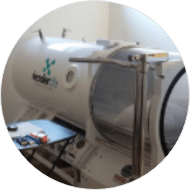Our Approach
 Advanced Pituitary Cancer Treatments
Advanced Pituitary Cancer Treatments
 Top-Rated Physicians
Top-Rated Physicians
 Personal Care
Personal Care
 Patient Satisfaction
Patient Satisfaction
Our Top-of-the-Line Medical Facilities
At New Hope Unlimited, we pride ourselves in providing superior comfort, cleanliness, and cancer care at our 8,000 square foot medical treatment center in San Luis Rio Colorado, Mexico. We worked with renowned architects and contractors to create the ideal space for recovery, which includes state-of-the-art lounge areas and spacious private in-rooms that assure the comfort of our patients and their loved ones.
To make our patients feel right at home, each private ward is equipped with high-definition U.S. television, quality bedding, and high-speed internet connection. And with proper nutrition playing a vital role in cancer recovery, New Hope Unlimited also fulfills the dietary needs of each patient using fresh, organic produce to prepare breakfasts, lunches, snacks, and dinners.
Comfort and cleanliness are also strictly implemented in our medical treatment rooms, which are equipped with the latest medical supplies and technology to provide the highest standard of care and treatment. Our medical center also has an in-house Hyperbaric Chamber, a well-established therapy for decompression sickness, exclusively available for our patients’ use.
Further, New Hope Unlimited has maintained its exceptional partnership with Hospital Migoo, a medical group comprised of certified physicians and specialists committed to our patients’ care and well-being.
Stories of New Hope
Life-changing tales of our cancer patient survivors.

FAQs
1. What specific treatments does New Hope offer?
From detoxification to nutrient supplementation, learn about our one-of-a-kind combination of conventional, alternative, and holistic treatments for tumors in the pituitary gland.
2. How effective are alternative treatments for pituitary cancer?
Cancer is a long, grueling battle for thousands of patients. When a battle is this important, you want a reliable weapon at your disposal. Our combination of conventional and holistic protocols helps arm your body with the best defense possible. From helping you reduce cancer symptoms to rehabilitating your immune system, New Hope can help make strategic recommendations to increase the effectiveness of your treatment and speed your recovery.



